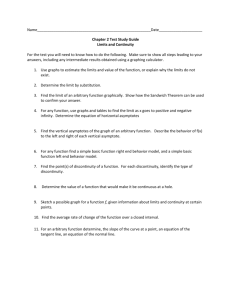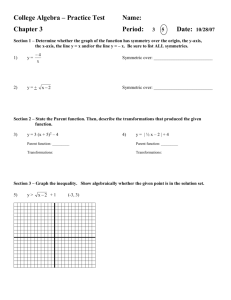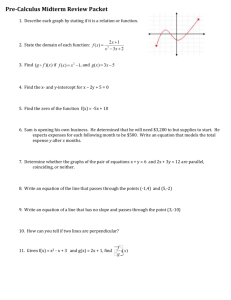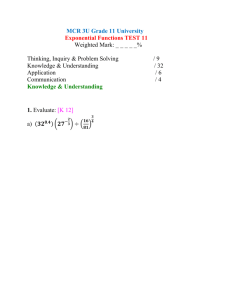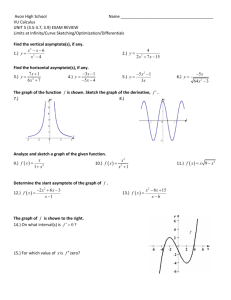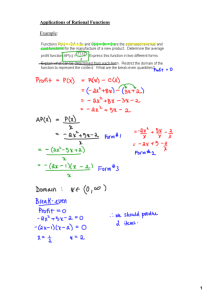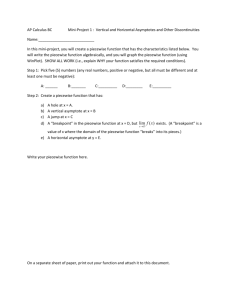asymptotes
advertisement
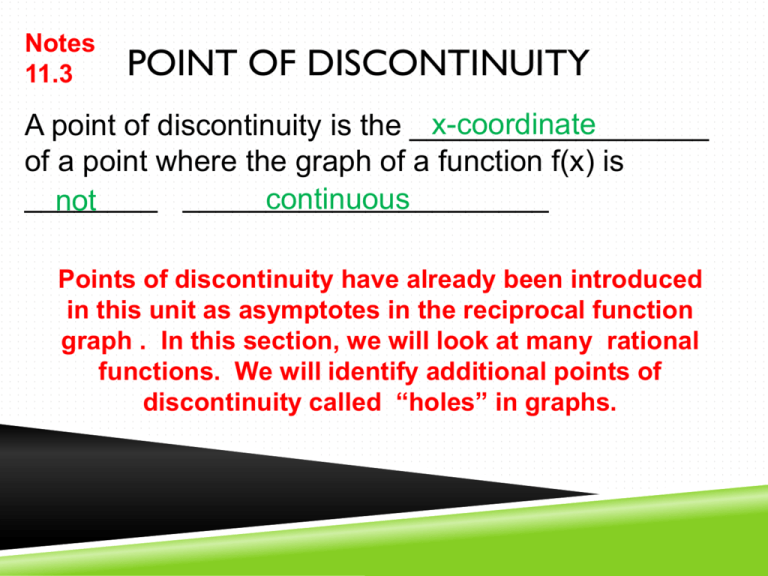
Notes 11.3 POINT OF DISCONTINUITY x-coordinate A point of discontinuity is the __________________ of a point where the graph of a function f(x) is ________ ______________________ continuous not Points of discontinuity have already been introduced in this unit as asymptotes in the reciprocal function graph . In this section, we will look at many rational functions. We will identify additional points of discontinuity called “holes” in graphs. REMOVABLE AND NON-REMOVABLE DISCONTINUITY Removable Non-removable ________ Hole in the graph ____________ Asymptote in the graph Could be ________________ continuous There is no way to if if _____________ the function redefine at that point ___________ redefine the function at that point to make it continuous The hole occurs in the equation where there is a common factor in the numerator and denominator, thus the ______________ ORIGINAL function is ______________ undefined at a specific x-value By the way, continuous graphs have no jumps, breaks, holes or asymptotes!! LETS EXPLORE HOW TO FIND POINTS OF DISCONTINUITY FIND POINT OF DISCONTINUITY : ASYMPTOTES Horizontal Asymptote: If Exponent is: y=___ BOB0 Bigger on bottom…0 BOTN Bigger on top…none EATS DC Exponents are the same Asymptote is Y=0 No H.A. Divide Coefficients of leading term Vertical Asymptote: Simplify Function and set denominator equal to zero and solve for x x=___ Ex. f ( x) x 1 2 x4 H. Asymptote: EATS DC y=3 Divide coefficients and get 1 for the fraction but then add the constant of 2 V. Asymptote: Set denominator equal to 0 X = -4 Pick 2 x-values to left and right of V.A. X Y -6 4.5 -5 6 -4 und -3 0 -2 1.5 This is non-removable discontinuity bc you can’t redefine the fcn and make the graph continuous FIND POINT OF DISCONTINUITY : HOLE(S) 1. Look at the given equation. 2. Factor the numerator and denominator 3. If there is a common factor, set that factor equal to zero and solve for x. 4. This x-value is where there will be a hole in the graph. EX: ( x 2 x 3) ( x 3)( x 1) Graph y ( x 3) ( x 3) 2 x 1 BOTN so no H.A. x+3 either causes a V.A. or a hole… Because x+3 factors out, there is a hole in the graph at x = – 3 This is removable discontinuity bc you can redefine the fcn at f(-3)=-4 and make the graph continuous Ex y x x 12 ( x 4)( x 3) 2 x 4 ( x 2)( x 2) 2 H. Asymptote: EATS DC y=1 Divide leading coefficients and get 1 for the fraction Hole: X Y -4 0 -1.2 -3 -1 0 1 4 3 3 10/3 0 4 2/3 Factor to see if anything factors out. Nothing factors out so there is no hole in the graph. V. Asymptote: Set denominator factors equal to 0 x = 2 and x = – 2 Pick x-values to left and right of V.A.. This is non-removable discontinuity bc you can’t redefine the fcn and make the graph continuous THE FUNCTION BELOW GIVES THE CONCENTRATION OF THE SALINE SOLUTION AFTER ADDING X ML OF THE 0.5% SOLUTION TO 100 ML OF THE 2% SOLUTION. (100)(0.02) x(0.005) y 100 x How many mL of the 0.5% solution must you add for the combined solution to have a concentration of 0.9%? 275mL of 0.5% solution 0.009(100 x) 2 .005 x .9 .009x 2 .005x .004x 1.1 x 275 to get a .9% solution You can also check this on the graphing calculator. Type the right side of equation into y1 and input 0.009 into y2. Use the intersection function (2nd calc 5) to solve for x. Opt f ( x) Oblique Asymptote (not tested) x 2x 3 x3 2 H. Asymptote: BOTN Bigger by one degree so there is an oblique asymptote Divide using synthetic division –3 1 y=x-5 R12 y = x – 5 is the oblique asymptote Graph on the TI84 to see what it looks like. 1 –2 –3 –3 15 –5 12 Vocab clarification : Match the following then discuss 11.3 Vocabulary Support Attributes of Rational Functions Concept List A. continuous B. discontinuous D. horizontal asymptote E. non-removable discontinuity G. rational function H. removable discontinuity C. factors F. point of discontinuity I. vertical asymptote Choose the concept from the list above that best represents the item in each box. 1. the line that a graph approaches as y increases in absolute value 4. This type of graph has no jumps, breaks, or holes. 7. This type of discontinuity appears as a vertical asymptote on the graph. 2. In the denominator, these reveal the points of discontinuity. 3. This type of discontinuity appears as a hole in the graph. 5. a function that you 6. a graph that has a one- can write in the form P ( x) f ( x) = where Q( x) P(x) and Q(x) are polynomial functions 8. The graph of f (x) is not continuous at this point. point hole or a vertical asymptote 9. the line that a graph approaches as x increases in absolute value HOMEWORK: WS 11.3

